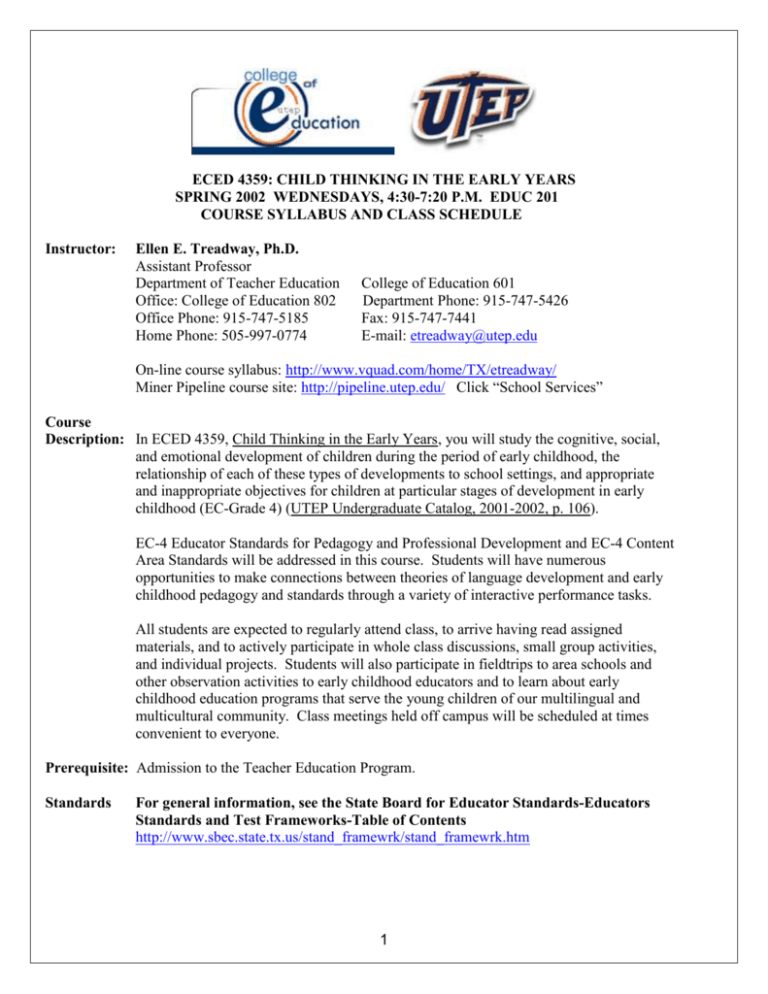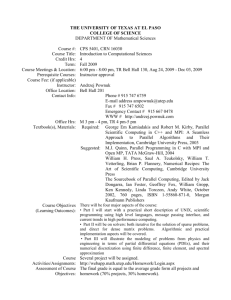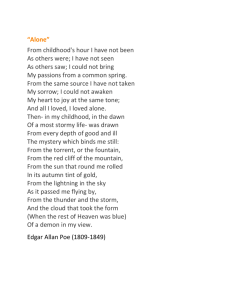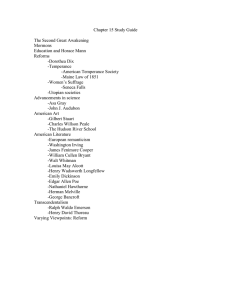Instructor: Ellen E. Treadway, Ph.D.
advertisement

ECED 4359: CHILD THINKING IN THE EARLY YEARS SPRING 2002 WEDNESDAYS, 4:30-7:20 P.M. EDUC 201 COURSE SYLLABUS AND CLASS SCHEDULE Instructor: Ellen E. Treadway, Ph.D. Assistant Professor Department of Teacher Education Office: College of Education 802 Office Phone: 915-747-5185 Home Phone: 505-997-0774 College of Education 601 Department Phone: 915-747-5426 Fax: 915-747-7441 E-mail: etreadway@utep.edu On-line course syllabus: http://www.vquad.com/home/TX/etreadway/ Miner Pipeline course site: http://pipeline.utep.edu/ Click “School Services” Course Description: In ECED 4359, Child Thinking in the Early Years, you will study the cognitive, social, and emotional development of children during the period of early childhood, the relationship of each of these types of developments to school settings, and appropriate and inappropriate objectives for children at particular stages of development in early childhood (EC-Grade 4) (UTEP Undergraduate Catalog, 2001-2002, p. 106). EC-4 Educator Standards for Pedagogy and Professional Development and EC-4 Content Area Standards will be addressed in this course. Students will have numerous opportunities to make connections between theories of language development and early childhood pedagogy and standards through a variety of interactive performance tasks. All students are expected to regularly attend class, to arrive having read assigned materials, and to actively participate in whole class discussions, small group activities, and individual projects. Students will also participate in fieldtrips to area schools and other observation activities to early childhood educators and to learn about early childhood education programs that serve the young children of our multilingual and multicultural community. Class meetings held off campus will be scheduled at times convenient to everyone. Prerequisite: Admission to the Teacher Education Program. Standards For general information, see the State Board for Educator Standards-Educators Standards and Test Frameworks-Table of Contents http://www.sbec.state.tx.us/stand_framewrk/stand_framewrk.htm 1 EC-4 Generalist http://www.sbec.state.tx.us/stand_framewrk/pdfs/pprec4r3.pdf Standard I: The teacher designs instruction appropriate for all students that reflect an understanding of relevant content and is based on continuous and appropriate assessment. Standard II: The teacher creates a classroom environment of respect and rapport that fosters a positive climate for learning, equity, and excellence. Standard III: The teacher promotes student learning by providing responsive instruction that make use of effective communication techniques, instructional strategies that actively engage students in the learning process, and timely, highly effective feedback. Standard IV: The teacher fulfills professional roles and responsibilities and adheres to legal and ethical requirements of the profession. Course Goals: On completion of ECED 4359, students will have: Critically analyzed and discussed issues related to the cognitive, social, and emotional development of children during early childhood, the intersection of these types of developments, and the stages of development as they related to developmentally appropriate instructional practices in early childhood programs through grade 4. Explored effective planning, teaching, and assessment methods for young learners according to individual needs and different program models designed to provide young children with a comprehensive, developmentally-appropriate educational program. Demonstrated proficiency at applying concepts and skills learned in this course through traditional evaluation techniques (quizzes, exams) and authentic assessment techniques (experiential learning activities, portfolios, performance assessments). Demonstrated an understanding of the expectations of EC-4 educators and the standards and competencies expected of EC-4 educators through a variety of activities completed in class and in the field. Observed, developed, demonstrated, and evaluated a variety of recommended instructional materials used in teaching reading and writing to young children. Created a standards-based instructional plan for literacy and language development with young children in multilingual and multicultural classrooms according to current theory and research on the best practices for young children. Instructional plans will be developed using state and district standards and performance-based student assessments that are used in early childhood programs in local schools with multilingual and multicultural student populations. Participated in professional development activities related to the study of cognitive, social, and emotional development in young children, which will be completed in class and in the field and reflect educational professionalism and personal maturity, such as cooperation and collaboration, peer mentoring, information sharing, and other activities that are expected of educators in the public schools of our state and community. Demonstrated a willingness to hear different points of view, to work with a variety of individuals, to communicate with others with respect and tolerance, and to model ethical and moral treatment of others regardless of gender, race, ethnicity, social class, language 2 dominance, or any other characteristic. This guideline is to be applied to your peers, as well as your course instructor. Students who do not follow this guideline will be asked to speak with the course instructor outside of class and may be asked to withdraw from the course if his/her behavior becomes a distraction for the group and interferes with teaching and learning in the classroom and/or in the field. Required Texts: Byrnes, J. P. (2001, 2nd ed.). Cognitive development and learning in instructional contexts. Boston” Allyn and Bacon. Hayes, C. W., Bahruth, R., & Kessler, C. (1998). Literacy con carino: A tosyr of migrant children’s success. Portsmouth, NH: Heinemann. *Henry, C. G., & Nath, J. L. (2001). Becoming a teacher in Texas: A course of study for the Professional Development ExCET. Belmont, CA: Wadsworth/Thomason Learning. *Bredekamp, S., & Copple, C. (1997). (Eds.). Developmentally appropriate practice in early childhood programs. Washington, DC: National Association for the Education of Young Children. *Texts will be used in other course in the Teacher Education Program and in review sessions for the ExCET exam. Also: You will need to save everything that you do for this class on a disk or on your computer’s desktop where it is easily accessible. At the end of semester, turn in your electronic portfolio on disk or on a CD-RW and turn in a blank CD-ROM in order to receive a class portfolio after the end of the semester. You will receive more information in class. Expectations: Attendance, punctuality, professional courtesy, and a positive, collaborative attitude are required for ECED 4359. I invite you to communicate with me by phone or via email if you have any questions about the course, readings, assignments, fieldtrips, or even the Early Childhood Education Program at UTEP. It is my job to serve you as your course instructor, to provide guidance throughout your educational career, and to be your advocate during your student teaching. A positive and professional relationship with your instructor and classmates. Your student teaching is just around the corner, so demonstrate your collegiality you’re your peers, knowledge of the profession in class, and desire to work with young children and their families in all aspects of this course. In the case of an absence, contact me ahead of time if possible. Provide a doctor’s note and/or a written explanation for an absence to be excused. In addition, read an article listed in ECED 4359 Recommended Readings and write a two page summary of the article and a two page reaction paper. Explain in detail how and why you would integrate the recommendations made by the article’s author(s) into your classroom teaching, planning, and assessment. Articles are located on the Internet for your convenience. 3 Note that the paper is due on the day that you return to class. One article summary and reaction paper is required for each day of absence. “The student is expected to attend all classes and laboratory sessions. It is the responsibility of the student to inform each instructor of extended absences. When, however, in the judgment of the instructor, a student has been absent to such a degree as to impair his or her status relative to credit for the course, the instructor may drop the student from the class with a grade of “W” before the course drop deadline and with a grade of “F” after the course drop deadline.” (UTEP Undergraduate Catalog, 2000 through 2001, p. 56). Incompletes will be considered on an individual basis during office hours. Make-up work is strongly discouraged. You will have sufficient time to complete your work for this course. We may discuss deadlines as a class, after which I may consider changing a due date. Do your best to stay organized and on time with readings and assignments. Multiple submissions: Do not resubmit work completed for other classes at UTEP. This is a good rule of thumb for all courses! You are expected to produce high quality work in this class. Pay close attention to spelling, grammatical errors, structure, and presentation. I welcome and encourage creativity, especially when it is part of a relevant and illustrative oral presentation, handson activity, or written report that may include graphic organizers and samples of student work. Practice using standard academic language in both Spanish and English, which includes proper grammar in oral language and written language. Finals week: We will meet during finals week at our scheduled time for final presentations and for a pachanga. Students with disabilities: If you have or believe that you have a disability, you may wish to self-identify. You can do this by contacting the Disabled Student Services Office (DSSO) to show documentation of a disability or to register to received testing and services. DSSO provides the following services: note taking, sign language, interpreter, reader and/or scribe services, priority registration, adaptive technology, diagnostic testing for learning disabilities, assistance with learning strategies/tutoring, alternative testing location and format, and advocacy. All information provided to DSSO is kept with the strictest rules of confidentiality. If you feel that you may have a disability that will need accommodations and/or modifications, contact DSSO at 915-747-5148 or email: sulopez@utep.edu. You can also visit the DSSO website at www.utep.edu.dsso or the DSSO office in Room 108 East Union Building. Course Requirements (see course calendar for a more detailed explanation of each activity): Participation in all class discussions, weekly assignments, field trips, chapter review questions/journal entries, and projects. Completion of all essays, reflections, and projects as assigned by the course instructor. Philosophy of teaching essay due at the beginning and end of the semester. 4 Course Elements: Grading Scale: Chapter quizzes, midterm exam, and final exam. Field experience and project. Integrated instruction plan for language development using standards-based, backward planning format. Completion of ExCET review activities in class. Collection of your work in an electronic portfolio where you will have the opportunity to showcase your work on a class CD-ROM. Attendance/Participation/Electronic Portfolio: 20% Weekly Readings/Quizzes/Assignments: 20% Midterm Exam: 20% Final Exam: 20% Field Experience Project or Research Paper: 20% Grade A B C D Meaning Excellent Good Average Below Average but Passing 100-90 89-80 79-70 69-60 Course Calendar Changes: As course instructor, I reserve the right to adjust the course syllabus, reschedule class, or change assignments as needed. I will be sure to give you plenty of notice prior to any changes. Remember that our course syllabus and class schedule are living documents! ECED 4359 Recommended Readings Spring 2002 “Creating Web-Based Language Learning Activities” by Sally Morrison, ERIC Clearinghouse on Languages and Linguistics http://www.cal.org/ericcll/faqs/RGOs/webcall.html “English Language Learners with Special Needs” by Sally Morrison, ERIC Clearinghouse on Languages and Linguistics http://www.cal.org/ericcll/faqs/RGOs/special.html “Language Policy and Planning” by A. Alkistis Fleischer, Georgetown University http://www.cal.org/ericcll/faqs/RGOs/policy.html 5 “Second Language Teaching Methodologies” by Sally Morrison, ERIC Clearinghouse on Languages and Linguistics http://www.cal.org/ericcll/faqs/RGOs/methods.html “Content Assessment in the Native Language” by Charles W. Stansfield http://ericae.net/digests/tm9602.htm “Tapping a National Resource: Heritage Languages in the United States” http://www.cal.org/ericcll/digest/brecht01.html “Culturally Responsive Curriculum” http://www.ericsp.org/pages/digests/crc.html "Should I Be a Family Day Care Provider?" by Ruth Wait, University of Rhode Island http://www.nncc.org/Prof.Dev/should.provide.html "A Profile of the Child Care Workforce" in Child Care Bulletin http://nccic.org/ccb/ccbja97/workforc.html "Child Care Providers Are Key to High-Quality Care" from ERIC Clearinghouse on Child Care http://www.ericeece.org/pubs/nl/nlfal97.html#c "Theories of Child Development and Learning" in Pathways http://www.ncrel.org/sdrs/areas/issues/students/earlycld/ea7refer.htm "Resource Rooms for Children: An Innovative Curricular Tool" by Sonja de Groot Kim http://www.ed.gov/databases/ERIC_Digests/ed369576.html "Montessori Programs in Public Schools" by John Chattin-McNichols http://www.ed.gov/databases/ERIC_Digests/ed348165.html "Multiple Intelligences: Gardner's Theory" by Amy Brualdi http://www.ed.gov/databases/ERIC_Digests/ed410226.html "The Worksheet Dilemma: Benefits of Play-Based Curricula" by Sue Grossman, Ph.D. http://www.earlychildhoodnews.com/archive/workshee.htm "What Are Children Learning When They Play?" by Marian Edelman Borden http://www.nauticom.net/www/cokids/Borden.html "Outdoor Play: Designing, Building, and Remodeling Playgrounds for Young Children" by Francis Wardle http://www.earlychildhoodnews.com/archive/outdoor.htm "The Influence of the Physical Design of the Dramatic Play Center on Children's Play" by Harriet Petrakos and Nina Howe http://www.udel.edu/ecrq/sum1112.html "Creative Play Helps Children Grow!" by Marilyn Lopes http://www.exnet.iastate.edu/pages/nncc/Curriculum/create.play.grow.html 6 "Designing Group Care Environments for Infants and Toddlers" by Louis Torelli http://nccic.org/ccb/ccb-jf96/designgr.html "Specialized Training for Infant and Toddler Caregivers" by Sheila Signer http://nccic.org/ccb/ccbjf96/spetrain.html "Language and Literacy Environments in Preschools" by Catherine E. Snow, M. Susan Burns, and Peg Griffin http://ericeece.org/pubs/digests/1999/snow99.html "Preschool Planning Guide" by Laura M. Thurman and Karen B. DeBord http://www.exnet.iastate.edu/Pages/families/nncc/Curriculum/planguide.html "The World of the Preschooler Is Truly Unique" by Alberta Johnson http://www.exnet.iastate.edu/Pages/families/nncc/Child.Dev/fdc25_world.uniq.html "Transition from Preschool to Kindergarten" http://www.nauticom.net/www/cokids/transition.html "He Has a Summer Birthday: The Kindergarten Entrance Age Dilemma" by Sandra Crosser http://ericeece.org/pubs/digests/1998/crosse98.html "The Role of Schools in Sustaining Early Childhood Program Benefits" by Doris Entwisle http://www.futureofchildren.org/lto/07_lto.htm "Full-day Kindergarten Programs" by Dianne Rothenberg http://ericeece.org/pubs/digests/1995/drkind95.html "Mixed Bag" by Debra Viadero http://www.edweek.org/tm/1996/01ages.h08 "A Developmental Approach to Assessment of Young Children" by Lilian G. Katz http://ericeece.org/pubs/digests/1997/katz97.html "Performance Assessment in Early Childhood Education: The Work Sampling System" by Samuel J. Meisels http://ericeece.org/pubs/digests/1995/meisel95.html "The Portfolio and Its Use: Developmentally Appropriate Assessment of Young Children" by Cathy Grace http://ericae.net/edo/ed351150.htm "Standardized Achievement Tests for Young Children? Not Yet!" – ACEI Position Paper http://www.nauticom.net/www/cokids/Standard.testsNOT.html "Critical Issue: Assessing Young Children's Progress Appropriately" in Pathways http://www.ncrel.org/ncrel/sdrs/areas/issues/students/earlycld/ea500.htm "Learning About the Performance-Based Approach to Education" in the Learning Resource http://fox.nstn.ca/~huot/perf-edu.html 7 "Understanding Rubrics" by Heidi Goodrich Andrade http://learnweb.harvard.edu/alps/thinking/docs/rubricar.htm "Early Childhood Assessment: A Position Statement" http://www.naspweb.org/information/index.html (Click position papers and then Click on Early Childhood Assessment) "Teaching with a Multicultural Perspective" by Rey A. Gomez http://ericeece.org/pubs/digests/1991/gomez91.html "Promoting Multiculturalism in the Early Grades" by Eddie L. Lucero http://www.naesp.org/comm/p0597a.htm "Culture in the Classroom" by Alison Levy http://www.earlychildhoodnews.com/archive/culture.htm "Celebrate Diversity!" by Marilyn Lopes http://www.exnet.iastate.edu/Pages/nncc/Diversity/divers.celebrate.html "Unbiased Teaching about American Indians and Alaska Natives in Elementary Schools" by Floy C. Pepper http://www.kidsource.com/kidsource/content3/unbiased.teaching.k12.2.html "Asian-American Children: What Teachers Should Know" by Jianhua Feng http://www.uncg.edu/edu/ericcass/diverse/digests/ed369577.htm "Blueprints for Indian Education: Improving Mainstream Schooling" by Robin A. Butterfield http://www.uncg.edu/edu/ericcass/diverse/digests/ed372898.htm "Identifying and Serving Recent Immigrant Children Who Are Gifted" by Carole Ruth Harris http://www.uncg.edu/edu/ericcass/diverse/digests/ed358676.htm "Implementing an Anti-Bias Curriculum in Early Childhood Classrooms" by Julie Bisson Hohensee and Louise Derman-Sparks http://www.uncg.edu/edu/ericcass/diverse/digests/ed351146.htm "Charting New Maps: Multicultural Education in Rural Schools" by Jenny Penney Oliver and Craig Howley http://www.earlychildhoodnews.com/archive/meeting.htm "Multicultural Play Awareness" by Sara Lundsteen http://www.earlychildhood.com/Articles/index.cfm?FuseAction=Article&A=31 The Individuals with Disabilities Education Act (IDEA) http://www.nectas.unc.edu/idea/idea.html The Gifted and Talented Students Education Act of 1999 http://www.cec.sped.org/pp/giftleg.htm "Passages to Inclusion: Creating Systems of Care for All Children" http://nccic.org/pubs/passages/passages.html 8 "Integrating Children with Disabilities into Preschool" by Karen E. Diamond et al. http://ericps.ed.uiuc.edu/eece/pubs/digests/1994/diamon94.html "Ten Policy Issues Influencing Preschool Inclusion" by Susan Janko and Alice Porter http://www.ed.gov/offices/OERI/ECI/newsletters/96fall/early1.html "Care for Special Needs" by Leslie Weiss http://www.4children.org/news/5-97need.htm "Technology Supports Inclusion in Preschool" http://www2.edc.org/NCIP/library/ec/Profile5.htm "Does Early Intervention Help?" by Barbara J. Smith http://www.ed.gov/databases/ERIC_Digests/ed295399.html "What You Should Know About Transitions for All Children" by Sarah Hadden http://www.nncc.org/Curriculum/cc41_transition.html "Children in Little Walden Reach Their Full Potential" by Gail Houle http://www.ed.gov/offices/OERI/ECI/newsletters/96spring/LittleWalden.html "Preparing Children with Disabilities for School" by Dianne Pinkerton http://ericae.net/edo/ED340147.htm "Disability Reading Research Benefits All Young Children" by Gail Houle http://www.ed.gov/offices/OERI/ECI/newsletters/97fall/early9.html "Multiage Grouping: Lifeline to Children At-Risk?" by Diane McClellan http://www.earlychildhood.com/Articles/index.cfm?FuseAction=Article&A=12 9 ECED 4356 Class Schedule Spring 2002 Standards Addressed Date Topic 1/16 -Course Overview -Introductions -Educator Standards -NAEYC 1/23 -Theories of Cognitive Development and Learning 1/30 -Memory -TEKS and TAAS 2/6 -Higher-Order Thinking -Introduction culminating project: Standards-based, backward planning -Motivation -Planning, Instruction, and Assessment 2/13 2/20 -Beginning Reading 2/27` -Reading Comprehension 3/6 -Writing 3/13 -Mathematics Learning Assignments Due -E-mail me from your UTEP e-mail account with reflections from the first day of class, your thoughts about activities you will do, and any questions you may have at the start of the semester. Include your course number, day, and time. Due by 1/23, 5 p.m. EC-4 Professional Development IV I-IV -Philosophy of Teaching Essay (3 pages, typed, double-spaced) *Read NAEYC, Part 2: Developmentally appropriate practice: The early childhood teacher as decision maker and refer to this chapter in your essay. -Byrnes, Chapter 1 & 2 (journal) -Henry & Nash, Chapter 1 -NAEYC Position Statement, Part 1 -Byrnes, Chapter 3 (journal) Henry & Nash, Chapter 2 -Byrnes, Chapter 4 (journal) -Quiz over Byrnes, Chapters 1-3 -Henry & Nash, Chapter 4 -Byrnes, Chapter 5 (journal) -Tentative Fieldtrip to the University Child Care Center (High/Scope Curriculum— Piaget) -Henry & Nash, Chapter 5 -Byrnes, Chapter 6 (journal) - NAEYC, Part 3 -Quiz over Byrnes, Chapters 4-6 -Byrnes, Chapter 7 (journal) -NAEYC, Part 4 -Henry & Nash, Chapter 7 -Byrnes, Chapter 8 (journal) -NAEYC, Part 5 -Byrnes, Chapter 9 (journal) 10 I-IV III I-IV 3/20 Spring Break 3/27 -MIDTERM EXAM -Scientific Learning -Social Studies Learning 4/3 4/10 4/17 -NAEYC, Part 4 -Draft of outline of culminating project: Standards-based instructional plan and reflection paper -Quiz over Byrnes, Chapters 7-9 University Closed (complete field assignment by 3/28) -Byrnes, Chapter 10 (journal) -Henry & Nash, Chapter 9 -Byrnes, Chapter 11 (journal) -Henry & Nash, Chapter 14 -Explaining Gender and -Byrnes, Chapter 12 (journal) Ethnic Differences -Group presentations, 1-5 -Henry & Nash, Chapter 11 -Presentations on -Group presentations, 6-18 Literacy con carino - Quiz over Byrnes, Chapters 10-12 4/24 -Presentations 5/1 -Presentations -Final Exam Review 5/8 -FINAL EXAM 5/11 5/15 5/21 -Commencement -Final Grades Due -Grades Mailed III -Henry & Nash, Chapter 8 -Final standards-based lesson plans due -Lesson Plan Presentations -Electronic portfolio on disk or CD-RW with data CD-ROM for class portfolio -Portfolio Presentations I-IV -In-class group activity and final exam All students are expected to attend. I-IV I-IV *Note: Detailed instructions for assignments listed above will be provided in class. You may receive additional assignments that are not listed in this course schedule. 11 ECED 4356 Spring 2002 Assignment Information Attendance/Participation/Electronic Portfolio (20%) o Attendance is expected on a weekly basis. In case of emergency, you will need to bring a doctor’s note or some other documentation of the event, as well as your summary/reaction paper of an article listed in the “Recommended Readings” section of this syllabus. Papers should be 4 pages in length to receive full credit. o Participation means that you will need to speak up in class during discussion, be a part of group activities, complete all aspects of your field experience, and work with your peers in a group presentation. o Your electronic portfolio will be a collection of all papers and project completed for this class. You will turn in a disk on the last day of class with a CD if you want a copy of the class’ portfolio. Save all work for the class from the start of the semester. We will meet in the computer lab to go over the simple instructions for the electronic portfolio. Weekly Readings/Quizzes/Assignments (20%) o Every week you will have a reading and writing assignments. Your weekly readings are very important, as they are the basis for your quizzes and exams. If you do not keep up with your reading assignments, you will not do well on your assessments. o After every three chapters, you will take a quiz over keyword definitions and major concepts. Quizzes will be scored by rubric, which you will receive prior to the first quiz. Quizzes will be based on key vocabulary at the end of each chapter that you are required to define in an electronic journal or folder on disk or computer desktop. I will periodically email you to ask for a copy of your journal entry. You will turn in your journal to me in your electronic portfolio at the end of the semester. o Assignments constitute every task that I assign you during the semester. You will receive points for turning in your work on time. For each assignment, you will receive a scoring rubric that will assist you as you complete your work. Midterm Exam (20%) o The midterm exam will over all readings and project through the first part of the semester. We will review before the schedule exam date, at which time I will share with you the scoring rubric. You must be in attendance on the day of the exam. There will be no make-up exam dates. 12 Final Exam (20%) o The final exam is a group project and individual performance assessment. We will meet during our scheduled class time. We will review before the final exam, and you will receive a rubric. The final will cover all readings and projects completed during the latter half of the semester. Like the midterm exam, you must be in attendance. There will be no make-up final exams. Culminating Project (20%) o Your culminating project will be a standards-based instructional plan developed using backward planning, a method for planning and assessing using the TEKS. In addition to the instructional plan, you will write a reflection paper about your plan linking your activities to the cognitive, social, and emotional development theorists and instructional programs that you read about in our text and discuss in class. The instructional plan should be integrated and literature-based with developmentally-appropriate activities and assessments for one grade level. You will receive the backward planning template and detailed instructions as to how to plan using this method. Again, save all of your work for your electronic portfolio, for your culminating project will be the major project of the portfolio. This assignment will include the paper and plan, as well as a presentation to the class. You will receive a detailed scoring rubric early in the semester to help you get started with this major assignment. 13






